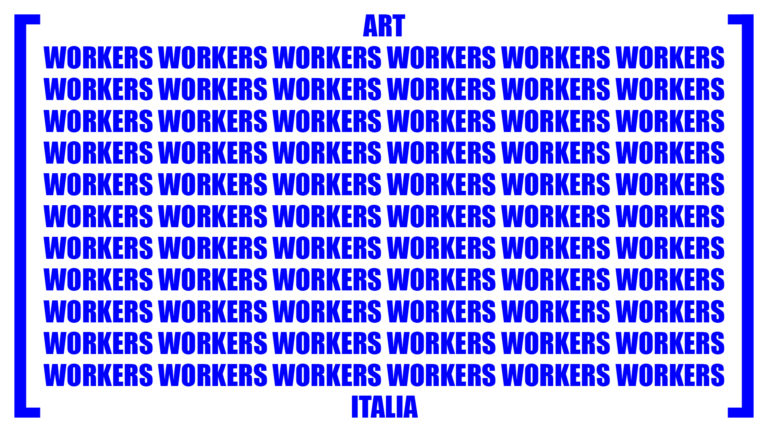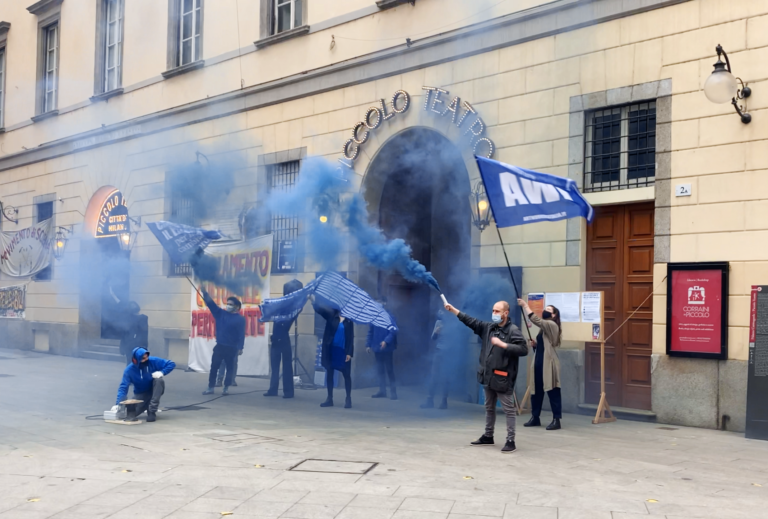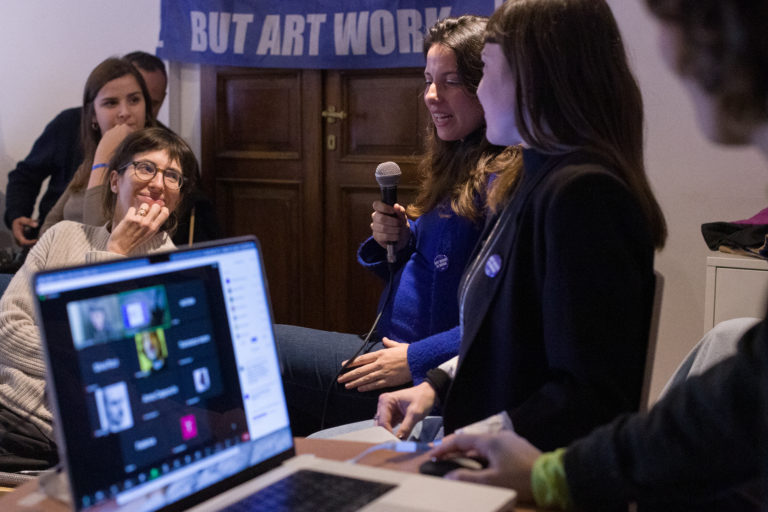Interview 2 of the series: Art at Work
Author: Danai Giannoglou
Looking back to 2020 and the outburst of the Covid-19 pandemic it becomes clear that this generalised health and economic crisis created many shifts for cultural workers. In the first interview of the Art at Work series, Myrto Katsimicha explains how SEST–Greece’s union of Workers in Contemporary Art–, was formed out of the necessities that became undeniable during that time. Meanwhile, not so far from Athens, Turin-based curator Lucrezia Calabrò Visconti was part of a very similar movement which gradually became an association, today known as AWI (Art Workers Italia). Calabrò Visconti who has experience both within and outside the institutional framework (right now serves as the chief Curator at Pinacoteca Agnelli) is the vice-president of AWI which invites members from the general Italian visual arts field and has as its goal to advocate and lobby for their rights.

Art Workers Italia's visual identity
Danai Giannoglou: What prompted the creation of AWI?
Lucrezia Calabrò Viscont: AWI catalysed a number of pre-existing necessities and urgencies. There had been thoughts about creating a group that could apply political pressure and defend art workers’ rights already for a while. However, everything came together quite suddenly in 2020 because the pandemic proved that there were no systems in place or regulations surrounding our sector. It became evident that we were unidentifiable, so practically invisible. This was a realisation that created a certain drive, at a moment when we also suddenly had time, because of the jobs we could not perform due to the forced stopping of all activities. These two conditions lead us to the gathering of a big group of people, who were eager to talk about shared problems and organise. It started in a very grassroot way of people joining forces in order to help each other and reflect together on the possibility of a structural change. During our first online meetings, hundreds of people joined. Quite early on we decided to split into working groups focusing on different aspects that needed to be researched on and implemented. In order to define our shared objectives and methodologies, we decided to collectively write a manifesto. Published on May 1st, 2020, the manifesto was the result of all the conversations we had and all the research we did in the first couple of months. When we signed it–thousands of people did–it was when we all recognised AWI as a tangible entity.
After this manifesto, which gave AWI its first shape, how did you crystallise its legal form? Why did you decide to become a research platform, an association, rather than a union?
LCV: This was a big discussion for the group, and we examined many different options. We chose the association because it was the closest to how we had already been working. At the same time, it was a choice shaped by Italian political and social specificities. The union system in Italy is quite connotated by the affiliation to specific political parties, and it has a complex history by which many radical groups don’t feel represented. This had a deterrent effect for us. Being an association gives us flexibility, and we are allowed to become a union at a later stage if we wish to proceed like that, but ultimately, we would like for AWI to be an interlocutor of unions rather than one. We work on political, technical, and cultural objectives on different scales, in collaboration with different entities (such as unions) depending on the specific aim we have. We still think it would be important for unions to incorporate art workers and culture in their agendas: they are not used to represent art workers because we do not have the numbers to be appealing for them, and secondly because there is a lack of understanding of our working conditions and of the way in which our jobs operate.

Art Workers Italia's national assembly in Milan, 2022 – © Stefano Colonna
How is AWI organised and governed? How do you define collective processes?
LCV: Being an association in Italy means having a board with a specific number of members. Technically we comply with this rule, however, we have decided to create a broader, informal ‘extended board,’ which allows us to be more polyphonic and operate in a less hierarchical way. Every decision is taken collectively, and when it comes to more important rulings, we always try to open it up to a wider members’ assembly.
To become a member of the association there is a yearly fee. There are three different rates, so that the organisation is both inclusive to art workers who cannot afford an expensive membership, but also allows people who want to offer higher financial support to do so. Even though some people initially disagreed with the existence of a membership fee, it allows us to create a pool of collective resources which are used to grant legal and fiscal support for our members, and to create tools useful for everybody: models of contracts, educational projects, rate charts, ethical guidelines, surveys, etc. In fact, while everyone in AWI is doing volunteer work, we pay our legal, fiscal, work experts, and the admin. We recently re-established our monthly general meetings, where non-members are also invited to take part. The idea is to take some space and time for collective discussion, reflection, and critical thinking, which often get in the background of more urgent political or technical objectives.
What are the pros and cons of self-organisation for AWI?
LCV: A major con is that we move slower than we would like to. It is ok for us to be moving at a slower pace if it guarantees that everyone feels more comfortable with the decision-making processes, but we don’t want to lose our ability of having quick reflexes, so this is a constant negotiation. For instance, we try to avoid voting. We prefer to talk things through until there is a general consensus. This can of course be very time consuming, but we prefer not to present our members with predetermined options to choose from. At the same time, being self-organised is also allowing us to shift our attention where we think it is most needed at any given time, and with no external pressures. For instance, right now we felt that advocating for Palestine should become a priority for AWI, and in order to do that we reached out to allies. We worked together with Il campo innocente, a group advocating for performance art workers in Italy, with whom we co-wrote an open letter expressing our solidarity, and with whom we are in conversation in order to raise awareness and put pressure on institutional politics.
You have created a number of tools that art workers can freely use, such as the contract templates and the Fair Compensation Guide. What do these tools guarantee and how have they changed your working conditions?
LCV: It is not as if everybody started using AWI’s tools right away, but their mere existence suddenly created a cultural shift in the Italian ecosystem. Employers might not take into account the exact artist fee we’ve put in our chart, but since this document is out there, it is no longer possible to invite an artist for a show and not pay them, which was the norm before. Swiftly, fair practices are being employed and it became easier for workers to say no when something is far from our standards: art workers can refer to our tools when they are being invited for a collaboration, and their negotiations, or refusals, are easier to be sustained and legitimised.

Art Workers Italia's national assembly in Rome, 2023 – © Antonio Perticara
What does the future hold for AWI?
LCV: Between AWI’s first steps and today a lot has changed in Italian politics: the rise of the right-wing government forced us to stop political conversations and law-making processes we were engaged in until that moment, and some of the tools we have created do not necessarily correspond to the current national situation. Somehow things have gotten much worse in the cultural sector than when we first set our objectives and we find ourselves having to fight for way more basic rights than what we anticipated. Some of our ambitions and objectives needed to be lowered. The conservative turn that took place in Italy as in many other countries didn't only affect the way we work in the arts, it affected the way we live our lives–independent journalism and free speech are under major attack from the government, which has also been openly supporting Israel's genocidal policies. Basic rights gained decades ago such as reproductive rights are being questioned, while many members of the government proudly promote misogynist, homophobic, and racist views. Poverty is on the rise and workers' conditions are worsening every day, in a place such as Italy, the only country in Europe where in the past 30 years wages have decreased instead of increasing. Let's say that the already shaky policies in support of the arts didn't get better in this situation, and at the same time the situation required that we focused on broader, more urgent matters. We hope that in the future we can make sure to continue pursuing our most ambitious goals despite the dramatic general political situation we all endure. We want to do less but loudly, focusing on big campaigns, such as artist fees and the systematic defunding of education and culture. We want to improve some of our existing tools, creating a digital fee calculator, finalise our ethical code, as well as a tool kit for art teachers who wish to become allies so that they can read, learn, and share with their students, informing them about their rights. But besides all that, I must say that in the last months we have been prioritising actions that relate to the genocide unfolding in Palestine. It is more urgent than anything else.
Published on May 21st, 2024
About the author:
Danai Giannoglou is a curator, writer and editor currently living and working independently between Athens and Amsterdam. Danai is the co-founder and curator of Enterprise Projects, a project space in Athens that has been functioning independently and periodically since September 2015, as well as the editor of Enterprise Projects Journal, a publishing initiative by Enterprise Projects in the form of a bilingual online publication of newly commissioned theoretical and research essays.